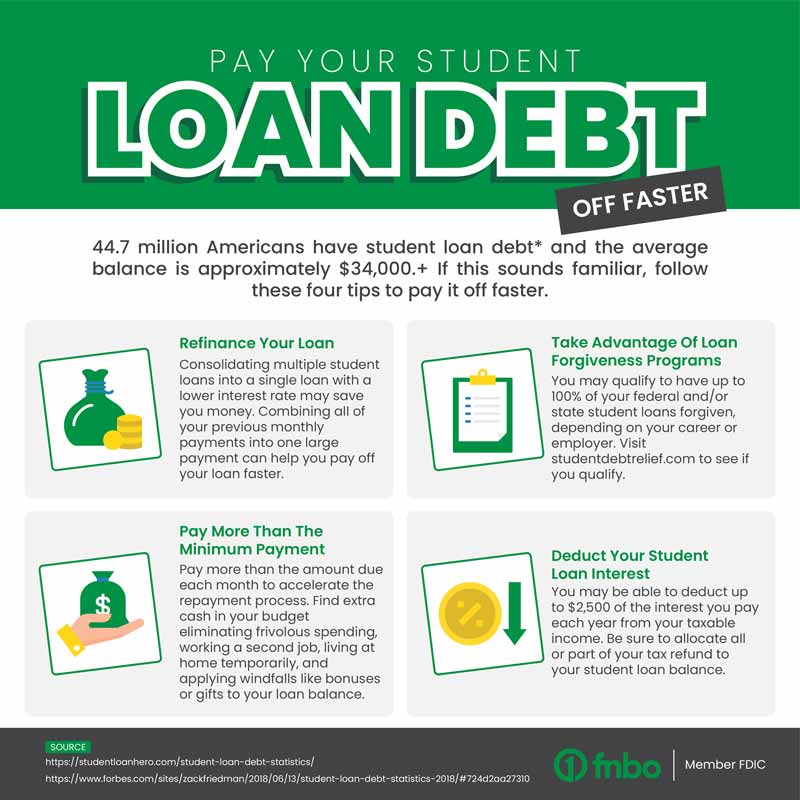FDIC-Insured - Backed by the full faith and credit of the U.S. Government
-
-
-
FNBO
Cashology®Apr 24 2023
-

Got Student Loan Debt?
Four ways to pay it off faster.
You did it - you went to college, you studied hard, made some great memories and even better friends. Now you finally have that well-deserved degree. Congratulations! Now you get to find your dream job, settle into adulthood… and start paying off those student loans. If this sounds familiar, you’re not alone. You and 43.5 million Americans are in the same boat, according to educationdata.org.. In fact, student loan debt is now so prevalent that it is considered the second highest consumer debt category behind mortgages with more than $1.63 trillion recorded in total student loan debt according to forbes.com. This equates to an average student loan balance of approximately $37,574.
While there are many types of student loans with varying interest rates and repayment terms, the median monthly student loan payment is $222 according to thecollegeinvestor.com. However, for the students who have chosen to defer their payments, a process that lets students temporarily reduce or postpone payments on their loan in order to return to college, go to graduate school or enter an internship, clerkship, fellowship or residency, that monthly payment jumps to $393. Even more shocking is that 11.5% of students are 90 days or more delinquent or are in default on their loans.
Fortunately for you, there are many things you can do to pay off your student loans on time or even well ahead of schedule. By following these four tips, student loan debt can soon be another college memory:
Refinance your loan
Whether you have private loans, federal loans or a combination of the two, refinancing multiple student loans into a single private loan with another financial organization may save you money. If the new loan has a lower interest rate than your existing loans you will pay less in interest over the term of the loan. Plus, by having only one monthly payment you can potentially pay off your loan faster by consolidating all of your previous monthly payments into one large payment. However, it is important to point out that refinancing a federal student loan into a private loan means losing features specific to federal loans such as the option to tie payments to income and get loans forgiven if you work for the government or a nonprofit.
Pay more than the minimum monthly payment
Paying the minimum monthly payments on time each month will pay off your student loans on schedule. But if you want to accelerate the process, consider making more than the minimum monthly payments. If your monthly budget is tight, consider these options for creating extra cash flow:
- Reevaluate your budget and find ways to save money by eliminating things such as the daily coffee, meals at restaurants or even cable.
- Offer to work additional hours at your job, apply for that overdue promotion, or even find a second job if you have extra time in your schedule.
- Move back in with your parents if your lifestyle and family situation permits in order to save on rent.
- Apply any financial windfalls such as a bonus at work, an unexpected inheritance, a tax return, or a long-forgotten repayment from a friend to your student loan balance.
Take advantage of student loan forgiveness programs
Depending on the career you’ve chosen or who you work for, you may qualify to have up to 100% of your federal and/or state student loans forgiven which can significantly reduce or eliminate your student loan debt. According to studentdebtrelief.com, the most common student loan forgiveness programs include:
- Public Service Loan Forgiveness - offers complete loan forgiveness to those who work in the public sector such as nonprofit employees, Peace Corps volunteers, public school teachers and staff, and government employees to name a few.
- Teacher Loan Forgiveness - designed to encourage students to enter the education field and to incentivize teachers to continue teaching, this program awards educators with a principal reduction of their federal loans.
- Disability Discharge Student Loan Forgiveness - offers a complete discharge of federal loans to borrowers suffering from a disability.
- Student Loan Forgiveness for Nurses - if you are a nurse, you may have access to a number of county, state and federal student debt forgiveness programs such as the Nurse Corps Loan Repayment Program and the National Health Service Corps Repayment Program. Plus, if you currently work for a hospital or clinic, your employer may even offer assistance with repaying your nursing school loans.
- Closed School Discharge - relieves students of their federal student debt if they are unable to attain their degree because their college or university closed down.
- Military College Loan Repayment Program - many U.S. military branches offer student loan forgiveness programs to incentivize individuals to join the military or the reserves.
Take advantage of student loan interest deduction
You may be able to deduct up to $2,500 of the amount of interest you pay each year from your taxable income. This may potentially increase the amount you receive as a tax refund by up to $550, according to NerdWallet. If this happens, be sure to allocate all or part of your tax refund to your student loan balance.
While paying off student loans may not be your favorite college memory, a little bit of hard work, combined with the student loan repayment programs available to you, can put you on the track to enjoying your adulthood in no time.
The articles in this blog are for informational purposes only and not intended to provide specific advice or recommendations. When making decisions about your financial situation, consult a financial professional for advice. Articles are not regularly updated, and information may become outdated.